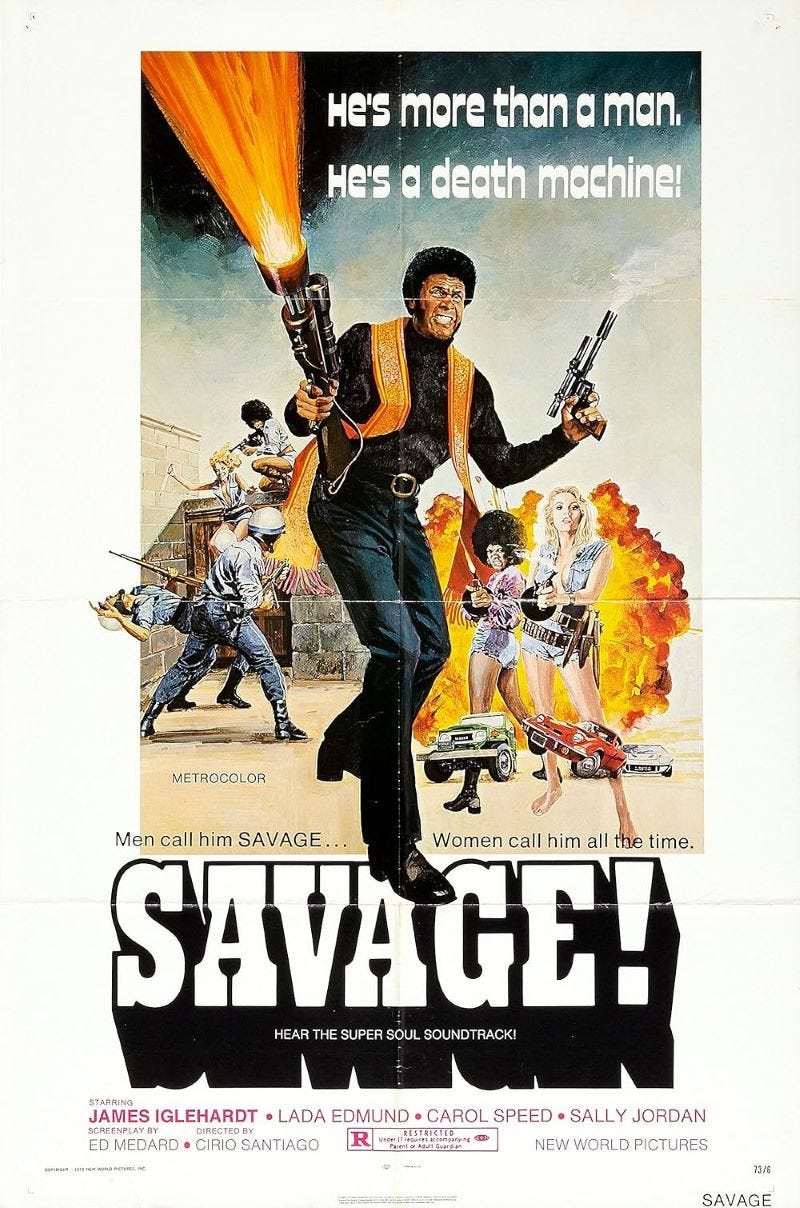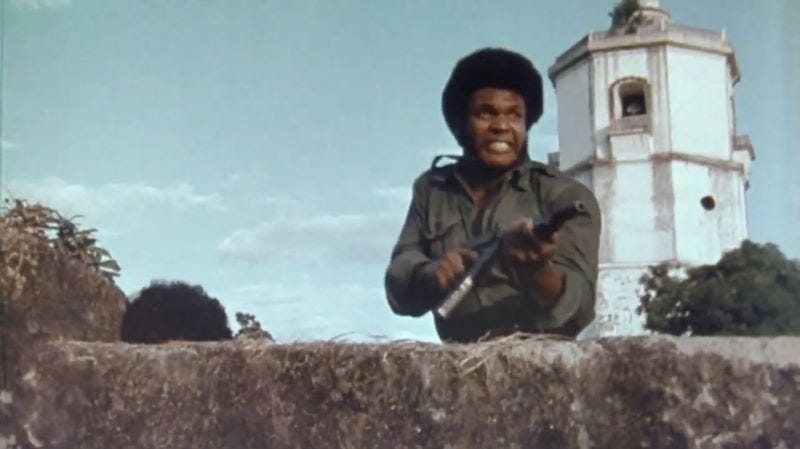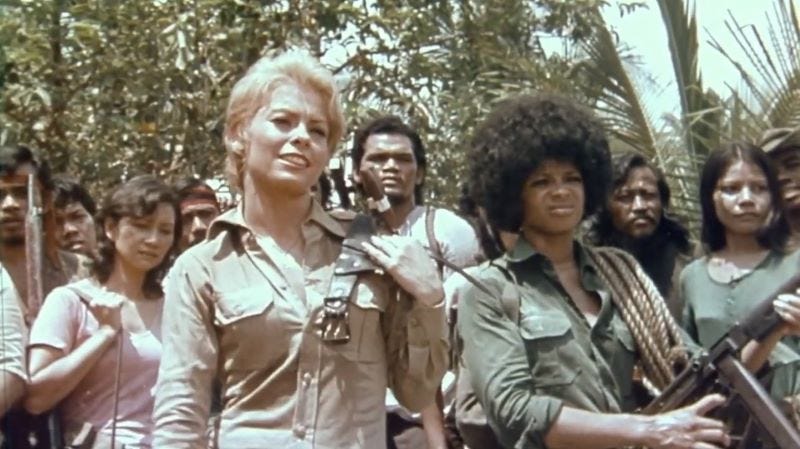Savage!
Written by Ed Medard
Directed by Cirio H. Santiago
1973
Revolution definitely seemed to be in the air in the 1970s, judging by the plots of exploitation movies. This is the third movie I’ve covered in this series that involved a populist revolution in a small Southeast Asian country (the previous ones being The Big Doll House and Black Mama, White Mama). Part of that may come from necessity; when low-budget filmmakers had the opportunity to shoot several movies in a row in the Philippines, they may have defaulted to a standard plot that they knew would work. But there may have also been a growing awareness of those types of movements going on around the world. There were a number of military dictatorships that took over Latin American countries in the 60s (many of them backed by the United States), as well as countries like Cuba where Communist regimes took control. For people at the time, it must have seemed like there was a great deal of instability, but also the opportunity for people to rise up against their oppressors if given the chance.
That desire for revolution could dovetail nicely with the Black revolutionary movement in the United States. In the post-Civil-Rights era, Black people were finally being treated as equals, at least in the eyes of the law, but as they continued to experience oppression, revolutionary groups who were willing to use force to protect their rights may have seemed like they would be necessary. Combining these two revolutionary impulses would seem like a great plot for a Blaxploitation movie.
That’s not quite what we get with Savage!, but it’s at least a feint in that direction. As mentioned, it’s one of the movies produced by Roger Corman’s New World Pictures that was shot in the Philippines, but it takes place in an unnamed country that could be somewhere in Southeast Asia or maybe even Latin America (some members of the country’s military speak a few lines of Spanish). There’s a populist revolution movement fighting against the country’s military regime, but they’re on the verge of defeat, partially due to the leadership of Jim (James Iglehart, who appeared in Beyond the Valley of the Dolls), an American who is said to be serving as a sort of advisor on behalf of the U.S. government but is really just a mercenary.
In the opening scene, Jim helps capture Moncada, the leader of the revolution, but he seems to be increasingly disillusioned about the work he’s doing. He sees that the military is planning to question Moncada and another woman who had been captured, but their “interrogation” of the woman is clearly going to involve sexual assault, and both she and Moncada will most likely be killed. He drives away in disgust and goes back to the hotel where he’s been staying, but he can’t get away from his troubles there, since a reporter is hounding him about the role he plays in the dictatorship’s military efforts. He tries to get drunk at the hotel bar with a couple of American women, Vicki (Lada Edmund, Jr.) and Amanda (Carol Speed, who was in The Mack), but his efforts to hit on Amanda are stymied when she finds out he works for the military. She tells him off, saying “You’re just another cop, and a pig’s a pig, regardless of race!”
When Jim learns that Moncada has been killed, he goes to confront the military leadership, and a guy known only as “the colonel” just blows him off, saying there’s no way they were going to give Moncada a trial, since that would just be a platform for him to voice his criticisms of the dictatorship. When Jim asks about the woman they were “interrogating,” the colonel says “I’m sure she died with a smile on her lips after satisfying my men,” which is apparently the last straw, since it causes Jim to snap and attack him. He gets knocked out and wakes up in a cell; looks like he killed the colonel, and now he is set to be executed himself. But when the military decides to move him to another prison in a very low-security operation, he manages to escape into the jungle.
At this point, it seems like Jim’s goal is to get out of the country, so he goes to Vicki and Amanda for help. They’re in the country as part of a circus-style act where they entertain the troops, who must be starved for pleasure if this is what they’re excited to watch. Their act consists of Amanda doing some rudimentary trapeze swings and a single backflip, followed by Vicki showing off some knife-throwing skills. They don’t seem to have any opinions about the dictatorship, and in fact, Vicki seems like she’s hoping to get into the good graces of the Minister of Defense, who is in attendance. Appallingly, she tells Amanda, “I figure if I play my cards right, I could be the next Eva Braun.” (Perhaps at this point in history, Nazis were just a joke, but from the perspective of 2024, where white supremacists carrying swastika flags are marching in the streets in celebration of the election of our new would-be fuhrer, it’s a horrifying thing to say.)
When the Minister of Defense discovers Jim hiding in Vicki and Amanda’s dressing room, Jim and Amanda go on the run, but Vicki gets captured, leading to some torture scenes that may have her rethinking her political stance. Meanwhile, Jim and Amanda get captured by the rebels who decide that they’re going to put him on trial for his role working for the military. But before they get the chance, the army attacks. In the chaos, Jim manages to take out some guys with a radio, which he uses to order an artillery strike on the military’s convoy. The rebels, realizing that his knowledge of military operations make him a good asset, decide to keep him alive, and he quickly starts turning things around for them, leading them to several victories and helping to build popular support. Eventually, the people take to calling him Savage (which is…kind of racist?), and he becomes the leading figure in the revolutionary movement, deciding that he’s going to fight to take down the country’s oppressors.
The rest of the movie is mostly a series of action scenes as the rebels wage their campaign and the military tries to stamp them out. It’s generally pretty engaging, but while some lip service is paid to the need to win people over to their side or the struggles of maintaining an effective rebellion, it’s not an especially serious look at a revolutionary movement that’s trying to topple an oppressive regime. The rebels mount a major operation to rescue Vicki, which does not seem like an especially important goal. After that, she and Amanda spend some time swimming in a pond while naked, giving an idea of where this movie’s priorities lie. Later, Amanda and Vicki use their respective acrobatic and knife-throwing skills during combat, adding an especially silly layer to a movie that was already teetering on the edge of camp.
But while this is more of an exploitation movie that focuses on delivering action and occasional boobs, it does try to make a few points. The rebels seem to have some understanding that as a Black man, Jim is used to dealing with oppression, and since his people have been fighting for freedom for centuries and are still doing so, he’s the perfect person to lead them. In a quiet moment with Amanda, Jim talks about how he got into trouble with the law as a kid and was given the choice between prison and the Army. Serving in the military gave him a sense of brotherhood that he hadn’t had previously, and while he doesn’t explain how he ended up working as a mercenary, he was definitely ready to fight for a cause with meaning rather than just serving as another tool of oppression. The message here is pretty rudimentary, but at least it’s something.
The movie itself is pretty workmanlike in its depiction of action, with lots of people spraying fire from machine guns and stuntmen throwing themselves out of windows after being shot. There is some occasional fun editing, with surprising jump cuts that add excitement. I liked one bit where Jim is showing off some sort of weapon he helped the rebels create that uses a bottle of fuel mounted on a rifle as a sort of makeshift firebomb. When somebody asks how it works, he fires off a round, and the movie cuts to a firebomb landing on a military building in the middle of a battle. There’s also a rousing score by Don Julian that provides a funky Blaxploitation-style rhythm to the action, helping to keep things moving at an enjoyable pace.
This is mostly a trifle, a goofy collection of action scenes strung together with a pretty basic plot. Iglehart is fine, conveying a sense of anger at injustice and a determination to do the right thing, but he’s not especially charismatic. Speed and Edmund seem to be enjoying themselves, and the various Filipino actors who fill out the minor roles provide a sense of seriousness about the problems the rebellion is facing. I probably can’t fault a low-budget action movie like this for putting together some battle scenes and calling it a day, but I would definitely like to see these ideas taken more seriously. Fortunately, I’m pretty sure there’s at least one more movie coming up that will have what I’m looking for…
Blaxploitation Education index:
UpTight
Cotton Comes to Harlem
Watermelon Man
The Big Doll House
Shaft
Sweet Sweetback’s Baadasssss Song
Super Fly
Buck and the Preacher
Blacula
Cool Breeze
Melinda
Slaughter
Hammer
Trouble Man
Hit Man
Black Gunn
Bone
Top of the Heap
Across 110th Street
The Legend of N***** Charley
Don’t Play Us Cheap
Shaft’s Big Score!
Non-Blaxploitation: Sounder and Lady Sings the Blues
Trick Baby
The Harder They Come
Black Mama, White Mama
Black Caesar
The Mack
Book of Numbers
Charley One-Eye
Ganja & Hess







If this had come out in the 1980s, they might have called it "Black Rambo".